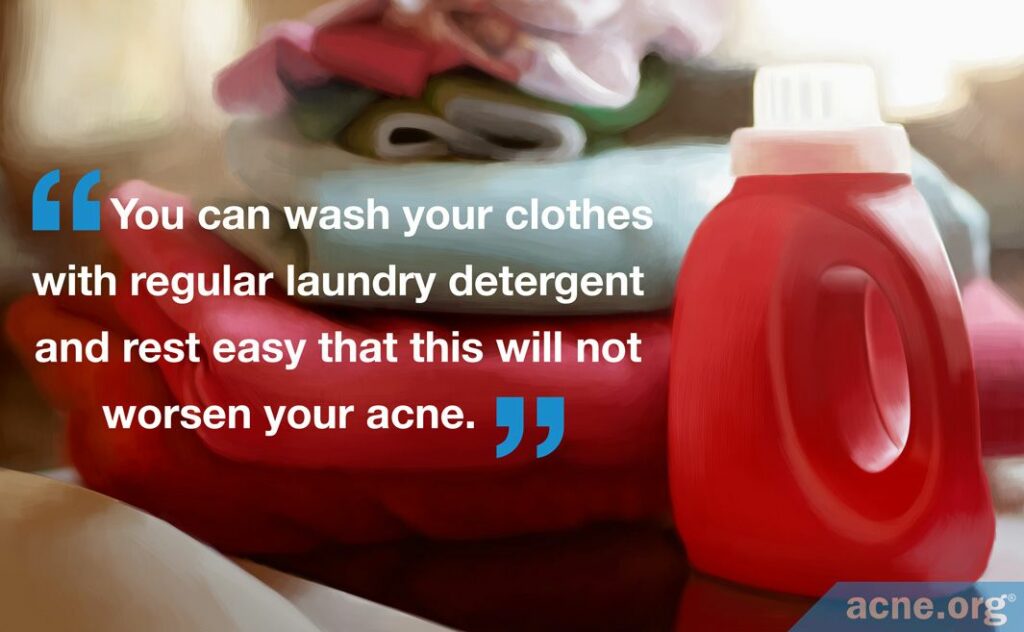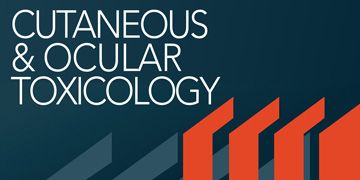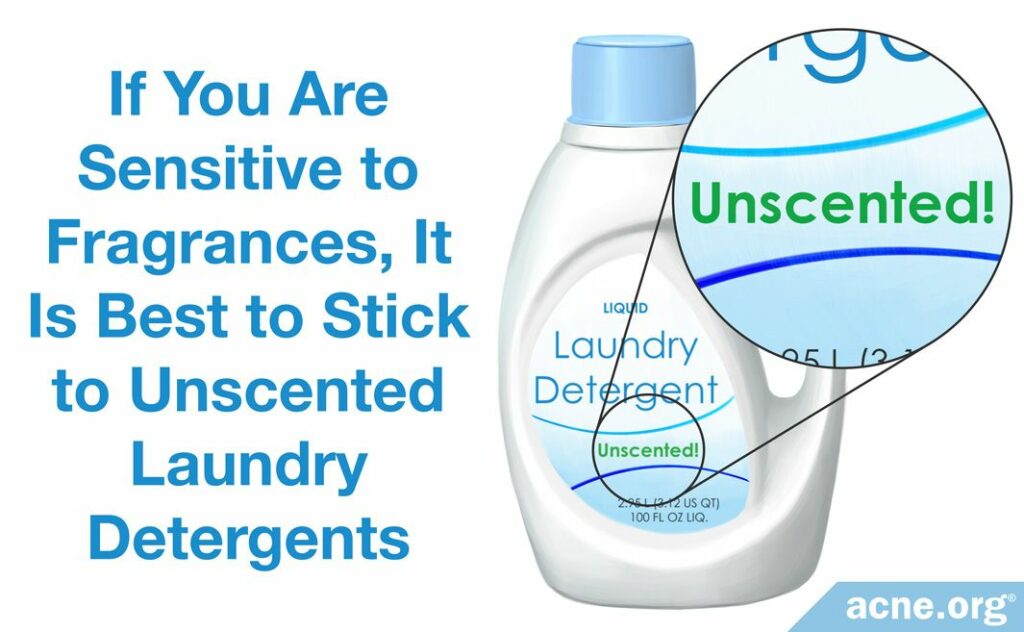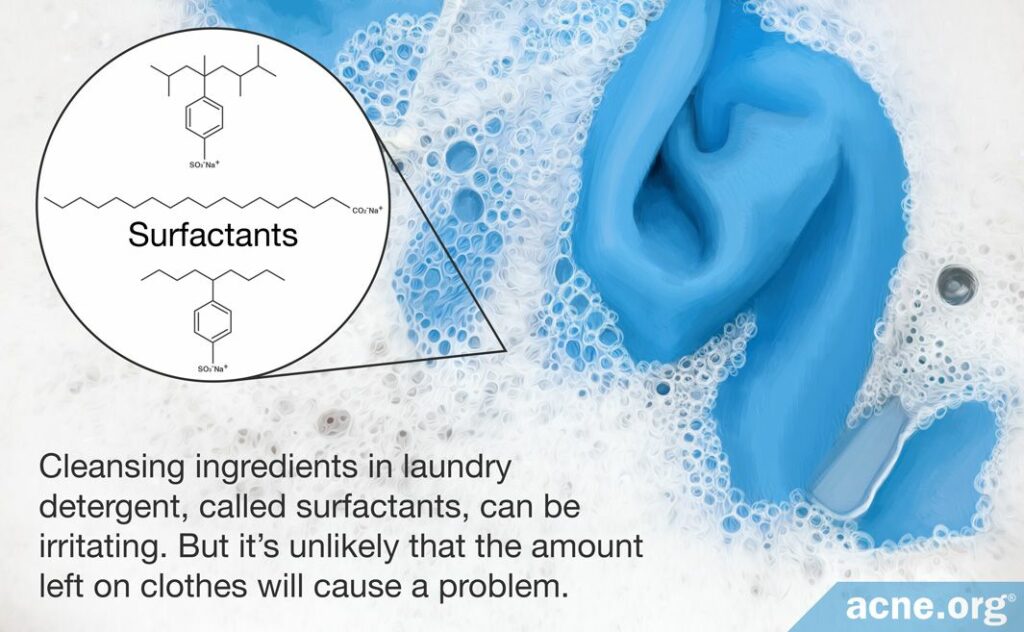No. Any Detergent Is Likely Safe to Use. But Use Unscented Detergent If Your Skin Is Sensitive to Fragrances.

The Essential Info
Laundry detergents contain harsh ingredients that can irritate the skin if applied directly to the skin. Irritation, in turn, can lead to acne. However, the amount of detergent that comes in contact with the skin from wearing clothes that have been washed, rinsed, and dried is minimal. Two studies performed so far suggest that this tiny amount of laundry detergent is highly unlikely to irritate the skin:
- Study 1: 516 participants wore clothes washed with various detergents over the course of half a year. None experienced skin irritation.
- Study 2: 738 volunteers wore a patch containing a small amount of laundry detergent directly on the skin for 48 hours. Only 0.7% of the volunteers developed a skin rash.
In other words, wearing clothes washed with laundry detergent, whether it is powder or liquid detergent, is unlikely to cause skin irritation and thus lead to body acne.
However, if your skin is sensitive to fragrances, avoid scented laundry detergents, which may irritate your skin.

The Science
- The Evidence on Laundry Detergent and Acne-prone Skin
- Scents and Fragrances in Laundry Detergents
- Irritating Ingredients in Laundry Detergents
- The Bottom Line
If your skin is acne-prone, you may worry that household chemicals like laundry detergent could trigger a breakout and make your body acne worse.
While it’s true that laundry detergent contains some harsh chemicals, the amount of these chemicals that remains on fabrics after washing, rinsing, and drying is minimal. Research suggests that such tiny amounts of detergent chemicals are safe for acne-prone skin. In other words, you can wash your clothes with regular laundry detergent and rest easy that this will not worsen your acne.

One thing to keep in mind: if your skin is sensitive to fragrances and scents, it is best to choose unscented detergents to avoid triggering skin irritation.
The Evidence on Laundry Detergent and Acne-prone Skin
To date, no studies have looked at whether laundry detergents might cause acne. However, two large studies have investigated whether small amounts of laundry detergent coming in contact with the skin can cause skin irritation. It is a well-established fact that skin irritation can lead to breakouts. However, these two studies found that exposure to small amounts of laundry detergent is highly unlikely to irritate the skin.
Study #1
Researchers recruited 516 women to take part in this study. The goal was to see whether, over half a year, wearing clothes washed with commercial laundry detergents could irritate the skin. Approximately half of the women used powder detergents to wash their clothes, while the other half used liquid detergents. By the end of the 6 months, none of the participants had experienced skin irritation from wearing the detergent-washed clothes. The researchers wrote, “No skin irritation experiences associated with the wearing of the fabrics were reported during or after the end of the usage period, either subjectively by any of the…volunteers or by dermatologic evaluation.”1 This is strong evidence that leftover laundry detergent on clothing is highly unlikely to cause skin irritation that might trigger acne.
Expand to reveal details of study

This study was published in the Journal of Toxicology: Cutaneous and Ocular Toxicology in 1994. The participants included 218 health women using powder detergents and 298 healthy women using liquid detergents. Between them, the women tested 3 different brands of powder detergents and 6 different brands of liquid detergent over the course of the study. All nine brands were readily available on the European and US markets and had a long track record of safety.1
At the end of 6 months, all the women reported that they had experienced no skin irritation from wearing clothes washed with laundry detergent. A dermatologist also examined each woman and found no skin irritation.1
Study #2
A total of 738 volunteers participated in this study. The researchers conducted a so-called patch test, which means that they asked the volunteers to wear a patch containing laundry detergent directly on their skin for at least 48 hours. The researchers then inspected the volunteers’ skin, looking for signs of irritation.2
At the start of the study, 10.7% of the volunteers suspected they were allergic to laundry detergent. However, after the patch test, only 0.7% developed skin irritation. In other words, while many people may worry that their skin is sensitive to laundry detergent, this is rarely the case.2 We should also keep in mind that wearing a patch soaked in detergent may not be a good test for what happens in real life, where you rinse the detergent off your clothes and dry them before putting them on.
Expand to reveal details of study

This study was published in the Journal of the American Academy of Dermatology in 2002. 61% of the participants were women and 18% had a history of allergic skin rashes.
To prepare the patches, the researchers diluted laundry detergent down to a concentration of 0.1% and placed it on pieces of paper. This concentration is a little on the high side of what might remain on clothes after washing and rinsing. According to the researchers, leftover detergent on clothes is usually in concentrations between 0.01% (10 times less than the amount in this patch test) and 0.3% (3 times more than in this patch test).
At the end of the 48-hour test period, the researchers looked for skin redness, small, red acne lesions (papules), crusts, and/or open sores (ulcers) as markers of skin irritation or skin allergy.2
Together, the results of these two studies indicate that leftover detergent on clothes is unlikely to cause skin irritation and thus lead to acne. In other words, you don’t have to worry about your detergent causing acne.
However, there is one but: if your skin is sensitive to fragrances, scented detergents could be a problem. Let’s take a closer look at why unscented detergents are a safer bet for people sensitive to fragrances.
Scents and Fragrances in Laundry Detergents

People who are sensitive to scents, fragrances, and perfumes can develop skin irritation when using scented products. For example, if you tend to get a rash from washing your hands with nice-smelling soap, you may be sensitive to scents.3
One study found that people who are sensitive to fragrances tend to be allergic to almost all fragrances found in cosmetics.4 In other words, if you’ve had an allergic reaction to one type of fragrance used in makeup or skincare products, you are likely to be sensitive to other fragrances and scents as well.
As we have already discussed, anything that causes skin irritation, such as a fragrance you are allergic to, can trigger acne. This means that if you are sensitive to scents, it is best to stick to unscented laundry detergents.
Fragrances in detergents marketed “for sensitive skin”
Several large manufacturers have developed special, lightly-scented detergents for people with sensitive skin. Some small preliminary studies suggest that these types of detergents may be safe for people who are allergic to scents and fragrances.5,6 However, we should note that these studies were sponsored by the manufacturers, so larger, independent studies are needed to confirm their findings. If you know you are allergic to fragrances, your best bet is sticking to unscented laundry detergents.
The verdict on laundry detergent and acne: To sum up, as long as there is no fragrance to irritate your skin, the leftover detergent in itself is unlikely to be a problem for acne-prone people.
Having said that, laundry detergents do contain harsh ingredients that could irritate the skin if you were to, say, decide to hand-wash your clothes in regular detergent. But at this point we are talking about the skin of the hands, and not about acne. If you are curious to know about the irritating ingredients in detergents, let’s take a closer look, but as you read on, remember that any laundry detergent should be perfectly fine for the vast majority of people who are prone to body acne.
Irritating Ingredients in Laundry Detergents
The most irritating ingredients in laundry detergent are called surfactants. The word “surfactant” stands for “surface-active agent,” which, in plain English, is a substance that removes dirt from the surface of fabrics.
Surfactants are the most important ingredient in laundry detergents, but they are also harshest on the skin. The same properties that make surfactants so good at removing dirt also make them a powerful skin irritant.7,8
How harsh surfactants irritate the skin

The main issue with surfactants is that they damage the so-called skin barrier. This is the outermost layer of the skin, and it acts as a wall that keeps moisture in, allowing our skin to stay hydrated. The skin barrier also prevents unwanted intruders like germs and chemicals from reaching deeper layers of the skin. In other words, the skin barrier is very important to the overall health of our skin.
When surfactants come in contact with the skin, they damage the skin barrier, making the skin more permeable. This allows moisture to escape, leading to skin dryness, roughness, tightness, and scaling. A damaged skin barrier also leaves the skin open to other harmful substances from the outside world, which can further irritate the skin. In addition, the surfactant itself may cause a reaction called contact dermatitis, in which the skin becomes red, rough, and itchy.

According to a 2014 article in the journal SKINmed, “Surfactants have an innate ability to irritate the skin and cause irritant contact dermatitis.”8
It is important to note that acne-prone people tend to have an impaired skin barrier to begin with. In other words, their skin is even more vulnerable to damage from surfactants compared to people who do not suffer from acne.
However, as we have already said, there is no need to worry about tiny amounts of leftover laundry detergent on your clothes, as these are highly unlikely to irritate acne-prone skin. Skin irritation due to surfactants becomes a problem only if your skin comes into direct contact with a significant amount of detergent.
How harsh surfactants irritate the skin: The full scoop
While direct contact with significant amounts of any surfactant can irritate the skin, some surfactants are harsher than others. There are four types of surfactants, ranked from harshest to mildest:
1. Anionic (negatively charged): These surfactants are very effective at removing dirt and relatively cheap, so they are often found in detergents as well as personal care products like body washes and shampoos. However, they tend to be harshest on the skin.
2. Cationic (positively charged): These surfactants are most often found in fabric softeners but may also be an ingredient in laundry detergent. They are less irritating to the skin than anionic surfactants.
3. Amphoteric (containing both positive and negative charges): These surfactants can behave more like anionic surfactants or more like cationic surfactants depending on the acidity (pH) of the liquid they are in. They may even behave like nonionic surfactants, the mildest type of surfactant, if they are placed in a neutral (not acidic or basic) liquid. In other words, how harsh these surfactants are really depends on what else is in the detergent.
4. Nonionic (not charged): These surfactants are less effective at removing dirt than anionic surfactants, but they are very good at removing skin oil and other oily stains. They are also the least irritating to the skin.7,8
Manufacturers often mix together several different types of surfactants in one product to maximize the detergent’s ability to remove different types of stains. Unfortunately, it may be very difficult to tell what type of surfactants are in your detergent.
Let’s look at exactly how these various types of surfactants can damage the skin barrier:
- Damaging keratin (skin protein found in the outer layer of the skin): All except nonionic surfactants damage keratin, making the skin more penetrable.
- Removing lipids (fats/oils found in the outer layer of the skin): All except nonionic surfactants can remove lipids from the outer skin layer. These lipids play an important role in retaining moisture in the skin, so without them, the skin may dry out.
- Binding to proteins in the outer layer of the skin: All types of surfactants can bind to skin proteins, disrupting the structure of the skin. This ultimately leads to skin dryness, roughness, tightness, and scaling.8
What Else Is in Your Laundry Detergent?
While surfactants are the main irritating ingredient in laundry detergent, they are far from the only ingredient. If you are curious, here is what else you can expect to find in your laundry detergent:
- Builders: These chemicals make detergent more efficient at cleaning by controlling the acidity and amount of minerals in the water. They also disperse and suspend dirt so it cannot re-deposit itself on clothing.
- Anti-redeposition agents: Similar to builders, these chemicals help prevent loosened dirt from reattaching itself to clothing.
- Zeolite: This chemical removes minerals from water, making the water “softer.” Softer water cleans clothes better.
- Alkaline agents: These chemicals make the cleansing solution more alkaline (basic), which helps to remove oily stains from clothes.
- Corrosion inhibitors: These chemicals help prevent rusting (corrosion) in parts of the washing machine.
- Processing aids: These chemicals give the detergent its physical shape, making it a powder or liquid.
- Colorants: These chemicals add color to the laundry detergent.
- Fragrances: These substances cover up the chemical smell of the detergent and the unpleasant smells of dirt and stains in the washing solution. Fragrances can also add a nice smell to the fabric after washing and can give the detergent itself a certain memorable quality. However, fragrances can cause skin irritation in people with sensitive skin.
- Oxygen bleach: This chemical removes stains and dirt from all fabric types.
- Suds control agents: These chemicals control the amount of foam generated during washing.
- [Liquid detergents only] Opacifiers: These chemicals give liquid laundry detergents a rich, non-transparent appearance.
- Enzymes: These substances help break down complex stains like blood or grass stains.7
- Preservatives: These substances prevent bacteria and mold from growing in the detergent. Although some preservatives, such as methylisothiazolinone, can cause an allergic rash, research shows that the amounts of preservatives left on clothes after washing are safe for consumers.9
The Bottom Line
No studies have looked specifically at whether laundry detergent causes body acne. However, there is some solid evidence that leftover laundry detergent on clothes is non-irritating to the skin. This suggests that wearing clothes washed with any regular laundry detergent, whether it is powder or liquid, is safe for acne-prone people and will not trigger a breakout. However, for people who are sensitive to fragrances, it is a good idea to choose unscented laundry detergents.
References
- Rodriguez C, Calvin G, Lally C, LaChapelle JM. Skin effects associated with wearing fabrics washed with commercial laundry detergents. Journal of Toxicology: Cutaneous and Ocular Toxicology. 13(1),39-45 (1994). https://www.tandfonline.com/doi/abs/10.3109/15569529409037508
- Belsito DV, Fransway AF, Fowler JF Jr, Sherertz EF, Maibach HI, Mark JG Jr, Mathias CG, Rietschel RL, Storrs FJ, Nethercott JR. Allergic contact dermatitis to detergents: a multicenter study to assess prevalence. J Am Acad Dermatol. 46(2), 200-6 (2002). https://www.ncbi.nlm.nih.gov/pubmed/11807430
- Rohtenborg HW, Hjorth N. Allergy to perfumes from toilet soaps and detergents in patients with dermatitis. Arch Derm 97, 417-421 (1968). https://www.ncbi.nlm.nih.gov/pubmed/5647218
- Larsen WG. Perfume dermatitis. Arch Dermatol. 113, 623-626 (1977). https://jamanetwork.com/journals/jamadermatology/article-abstract/537178
- Frederick DM, Vorwerk L, Gupta A, Ghassemi A. Dermal safety assessment of Arm & Hammer laundry products formulated for sensitive skin. Cutan Ocul Toxicol. 36, 263-272 (2017). https://pubmed.ncbi.nlm.nih.gov/28073339/
- Kwon S, Holland D, Kern P. Skin safety evaluation of laundry detergent products. J Toxicol Environ Health A. 72, 1369-1379 (2009). https://pubmed.ncbi.nlm.nih.gov/20077208/
- Bajpai D, Tyagi VK. Laundry detergents: an overview. J Oleo Sci. 56(7), 327-40 (2007). https://www.ncbi.nlm.nih.gov/pubmed/17898499
- Crawford C, Zirwas MJ. Laundry detergents and skin irritancy- A comprehensive review. Skinmed. 12(1), 23-31 (2014). https://www.ncbi.nlm.nih.gov/pubmed/24720081
- Hofmann, M. A., Giménez-Arnau, A., Aberer, W., Bindslev-Jensen, C. & Zuberbier T. MI (2-methyl-4-isothiazolin-3-one) contained in detergents is not detectable in machine washed textiles. Clin Transl Allergy. 8, 1 (2018). https://pubmed.ncbi.nlm.nih.gov/29312657/
The post Can Laundry Detergent Cause Body Acne? appeared first on Acne.org.
